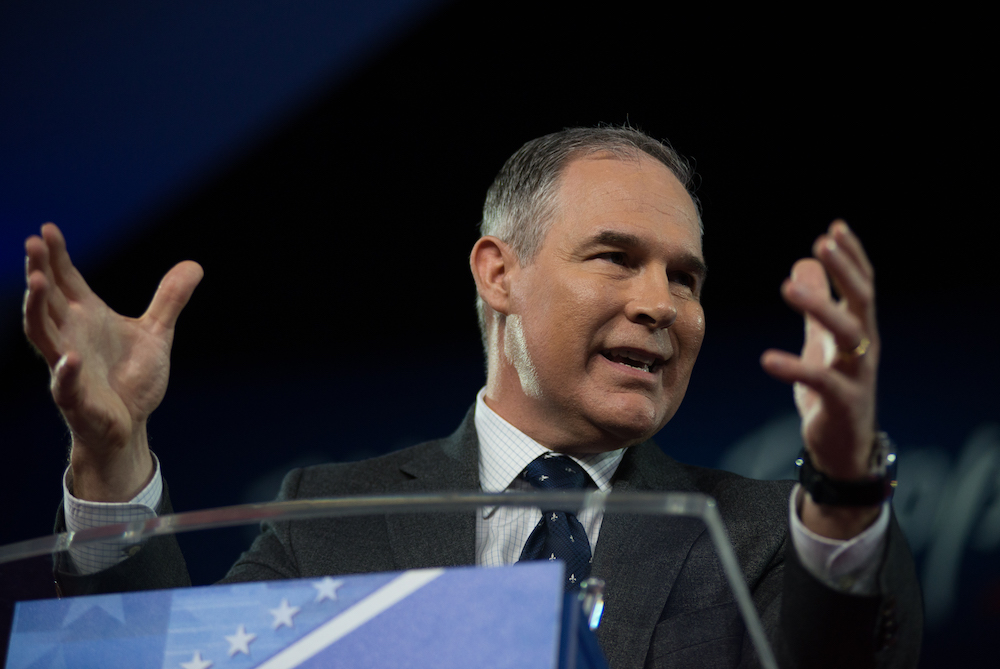Note from the editor: On April 24, U.S. Environmental Protection Agency (EPA) Administrator Scott Pruitt released a proposed rule that would restrict which scientific studies EPA could use in creating new regulations. The move — already controversial when it was first revealed over a month ago — would prevent EPA from considering studies in which the data is not available to the public, including the private health information of individuals in medical studies, and which is based on one-time events, such as the 2010 BP oil spill in the Gulf of Mexico.
Prominent climate science deniers were in attendance at the EPA announcement, including Marc Morano, Steve Milloy, and Will Happer.
The era of secret science @EPA is coming to an end. The ability to test, authenticate, & reproduce scientific findings is vital for integrity of rulemaking process. Americans deserve to assess legitimacy of the science underpinning Agency decisions. ➡️ https://t.co/eBbdX4UTGw
— Administrator Pruitt (@EPAScottPruitt) April 24, 2018
By ClimateDenierRoundup. Originally posted on Daily Kos on March 19.
On March 16, E&E reported that EPA Admin Scott Pruitt is brewing more plans to further hobble how the EPA uses (or in this case, doesn’t use) science to protect the public. According to E&E, the effort will be similar to the Orwellian-esque HONEST Act that Lamar Smith sponsored a year ago but is stalled in the Senate. Pruitt’s idea is to apply a blanket set of new criteria to studies the EPA can cite. The “sound science” recommendations are designed to sound reasonable, but in practice would render lots of high quality, relevant research off-limits.
Sharon Lerner at The Intercept wrote last summer that that this “sound science” concept — demanding all science used to inform regulations be made publicly accessible — comes straight from a 1996 memo from lobbyist/lawyer Chris Horner to tobacco giant R.J. Reynolds. Horner advised the tobacco company that because the EPA was probably going to be looking further into the health impacts of smoking, the agency should “construct explicit procedural hurdles [it] must follow in issuing scientific reports.”
Horner’s memo gives specific attention to the fact that these efforts should target “extra-judicial” documents, meaning those that can’t be ruled on by the courts. In particular, the 1996 memo referenced the agency’s Science Advisory Board reviews, underpin regulations but aren’t legally bound by the Administrative Procedures Act. He suggested the tobacco industry should be “initiating reforms by playing a strong role in molding and guiding Congress’s oversight of EPA’s latest Clean Air Act initiative (on PM 2.5/ozone.)”
Lerner explains that along with Chris Horner (whose career has gone from strategizing for tobacco to evade regulation to working on behalf of coal companies to harass climate scientists), another major advocate of this push to identify “extra-judicial” approaches is Steve Milloy. Like Horner, Milloy has worked on behalf of both coal and tobacco and is now affiliated with the Energy and Environment Legal Institute.
Milloy was present at Heritage for Pruitt’s announcement earlier this week, per E&E, and told them this will happen “sooner rather than later.” Remember that Milloy successfully pushed to have PM2.5-skeptical industry-friendly researchers installed on the Science Advisory Boards.
Pruitt’s scheme — which is, of course, strongly opposed by scientists and scientific organizations — appears to be twenty years in the making. The ’90s really are back: Pruitt stands ready to turn Big Tobacco’s 1996 dream into yet another one of 2018’s nightmares.
While Pruitt’s financial connections to the fossil fuel industry have been well-reported, there doesn’t seem to be any clear ties between him and his organizations to big tobacco. But we did find that as Oklahoma Attorney General, Pruitt decided not to join a bipartisan group of AGs calling for retailers to stop selling tobacco products.
There’s really no telling if the industry is giving money to Pruitt-affiliated groups like the fossil fuel industry has.
But where there’s smoke, there’s fire, and be it from a cigarette or a coal plant, it’s not good for public health.
Main image: EPA chief Scott Pruitt speaking at CPAC 2018. Credit: Zach D. Roberts for DeSmog
Subscribe to our newsletter
Stay up to date with DeSmog news and alerts







